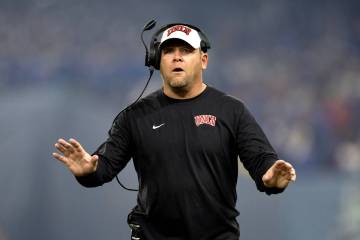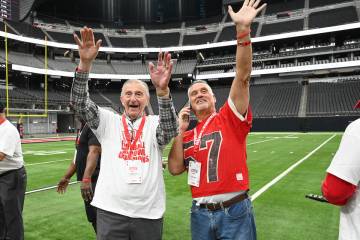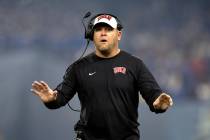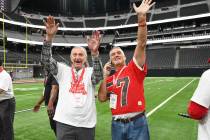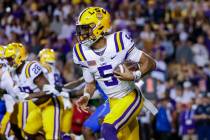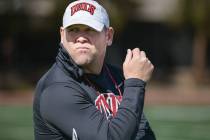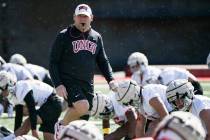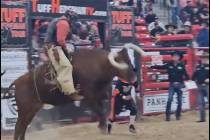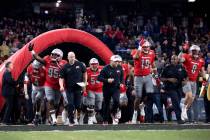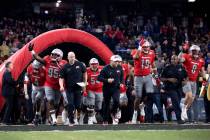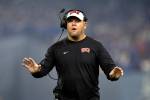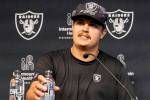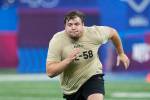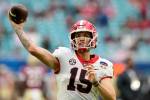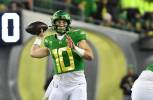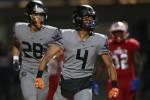Former UNLV football coach Tony Knap dies at 96
Tony Knap, who as UNLV's football coach guided one of the most exciting periods in the program's history, died Saturday night, one of his daughters said Monday.
Knap, 96, suffered from Alzheimer's disease and was living in a retirement home in Pullman, Wash., with his wife Mickey, 91. Their 70th wedding anniversary was in April.
Jacki Knap Wright said her father died at approximately 10 p.m. Saturday.
"He lived a long life, but it's still sad to hear," said Rich Abajian, who was UNLV's secondary coach under Knap. "It certainly takes it out of you, as much influence as he had on my life. He was a good man. He taught me about life, he taught me about football, he taught me everything.
"He certainly lived life to the fullest, doing what he wanted in life. He looked for the best in people."
Knap, nicknamed "Silver Fox," oversaw the longest period of success in UNLV football history, led the team into Division I-A, introduced a wide-open offense and landed the program's greatest player.
With a 47-20-2 record from 1976 to 1981, he won more games than any coach in the program's history. The Rebels had winning records the first five seasons and went 6-6 in 1981, giving Knap a 69.6 winning percentage, second only to Ron Meyer's 77.1 percent from 1973 to 1975.
Knap's overall record was 143-53-4 over 18 seasons. He went 25-14-1 at Utah State from 1963 to 1966 and 71-19-1 from 1968 to 1975 at Boise State.
Abajian, now part owner of Findlay Toyota, said Knap put so much time into his game plans that it usually wasn't set until Wednesday and sometimes even Thursday, but the attention to detail usually paid off.
"He always found a way to keep people off guard," Abajian said. "Coach Knap was one of the first to use the techniques of 'X-ing and O-ing' football, and take the talent he was given and make it as formidable as anybody."
Former quarterback Sam King agreed.
"You take those '79, '80, '81 teams, and the thinking was way, way out of the box," King said. "The other thing is he encouraged the other coaches to give their input."
Knap was inducted into the Southern Nevada Sports Hall of Fame in 2004.
"I feel good about what I accomplished at UNLV," Knap once said. "We did a lot of good things there, and I'm proud of it."
Knap guided the Rebels to a 9-3 record in his first season, which included a 27-6 loss at Akron in the first round of the Division II playoffs.
The jump to Division I-A in 1978 started a little rocky, with UNLV opening 0-3, but the Rebels then won seven games in a row. They concluded the season against Brigham Young in Yokohama, Japan, losing 28-24 to finish 7-4.
As Knap neared the end of his six-year run, he showed he had plenty left in leading UNLV to what many still consider the biggest victory in school history. The Rebels went to Provo, Utah, in 1981 and defeated No. 8 Brigham Young, 45-41.
That game was emblematic of the style of play Knap installed. The Rebels were wide open, with the quarterback calling his own plays.
Abajian said Knap's philosophy for giving the quarterback such responsibility applied to more than just football.
"For a quarterback, in his life there will be more important things than in a football game, so he should try and learn how to make decisions," Abajian said.
Abajian added Knap believed those on the field knew what was taking place more than those on the sideline.
King, who quarterbacked that victory over BYU, agreed that being able to call his own plays had a lasting effect.
"The truth is they didn't just do it with me, but they demanded that from whoever was in the game," said King, now an insurance agent. "He was always creating competition, so I knew if I didn't get the job done, I'd be watching from the sideline. Knowing that could happen made me want to be prepared."
Knap also knew something about bringing in talent, signing quarterback Randall Cunningham, generally considered the greatest player in the program's history. Cunningham, who played 16 seasons in the NFL, still is UNLV's career passing leader.
Cunningham said Knap's "honesty" prompted him to join the Rebels.
"They were real," Cunningham said. "They showed that they cared."
However, Cunningham only practiced for Knap, redshirting his first season. Then Knap retired before he had the chance to coach Cunningham in games.
"(Knap) was really laid-back, just an old, debonair, suave brother," Cunningham said.
Even though Knap missed out on being able to run those wide-open offenses with Cunningham at the controls, at 67, he knew it was time to step away.
"I was breaking down physically," he once said. "It was to the point where I couldn't make it through a practice. It was time to go."
Knap was hospitalized in June 2000, undergoing a quintuple heart bypass at age 85.
In addition to his wife and daughter Jacki, who lives in Moscow, Idaho, Knap is survived by daughters Angie Nelson of Las Vegas and Caroline Smith of Hawaii.
Funeral arrangements are pending.
Contact reporter Mark Anderson at manderson@reviewjournal.com or 702-387-2914. Follow him on Twitter: @markanderson65.





